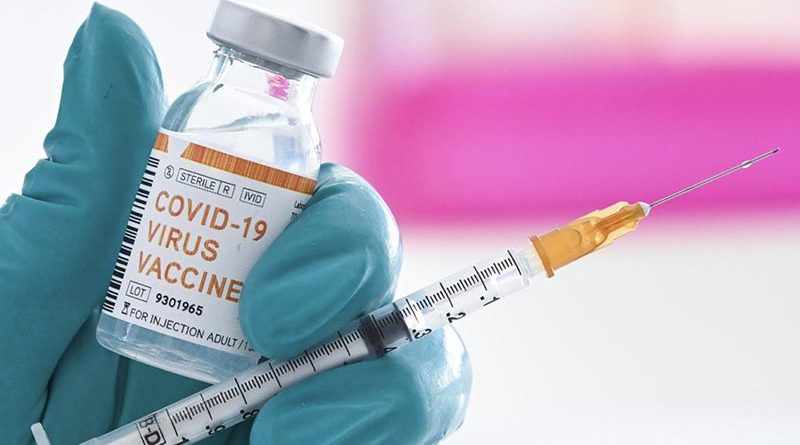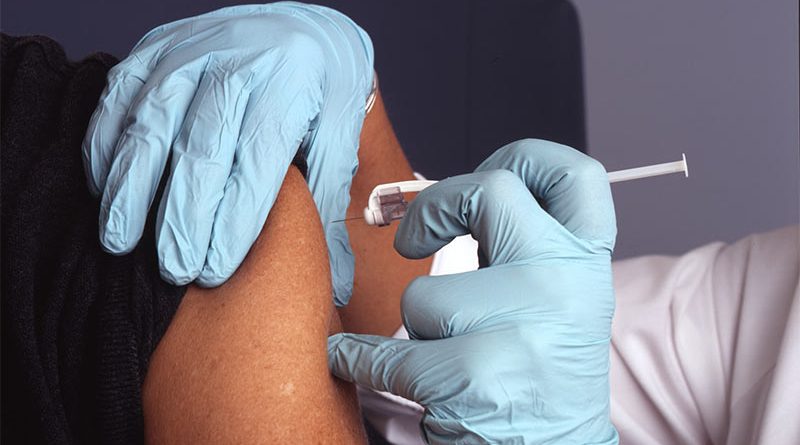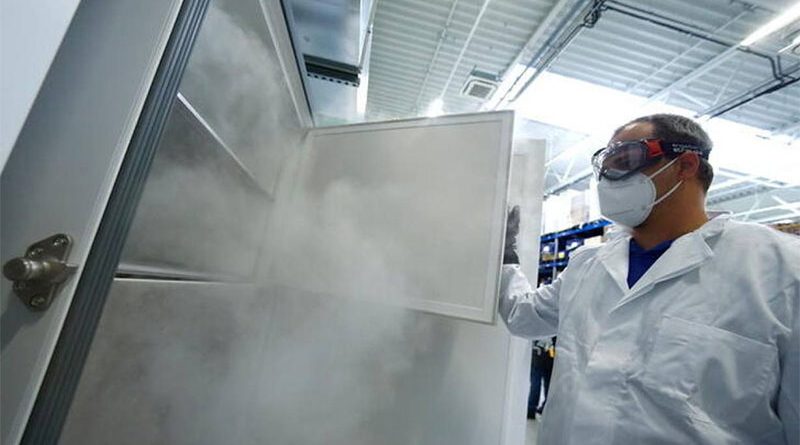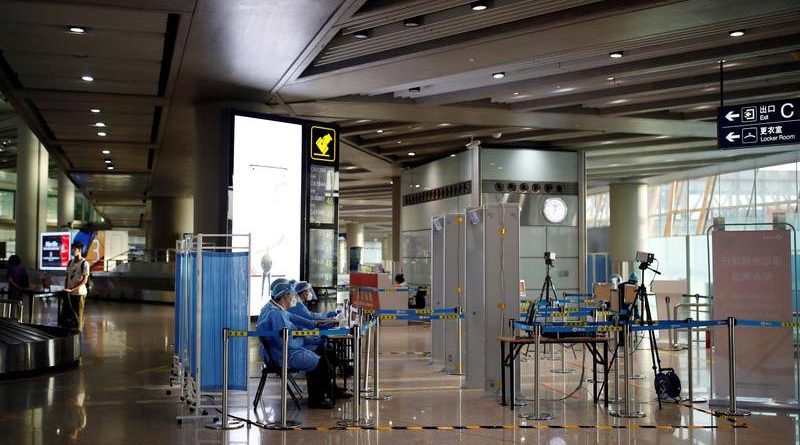THE World Health Organization does not foresee mandatory vaccinations being introduced around the world to stem the spread of the coronavirus, officials have said.
Information campaigns and making vaccines available to priority groups such as hospital workers and the elderly would be more effective, the WHO said, as the global death toll has topped 1.5 million, according to Reuters calculations.
Britain begins its vaccine programme this week and others are likely to follow soon, so authorities are seeking to reassure people of vaccines’ safety and efficacy in order to get a critical mass to take them in the face of what experts say are conspiracy theories entering the mainstream.

“I don’t think we envisage any countries creating a mandate for vaccinations, ” Kate O’Brien, WHO’s director of immunisation vaccines and biologicals, told a news conference.
“There may be some countries or some situations in countries where professional circumstances require it or highly recommend to be vaccinated,” she added, saying hospitals might be one such instance.
The WHO’s top emergency expert, Mike Ryan, added: “We are much better served to present people with the data, present people with the benefits and let people make up their own minds, within reason.”
Even when vaccines were developed, research must continue O’Brien said, saying many vaccines for other diseases had been improved over time.
The WHO was still waiting to start discussions with the incoming Joe Biden administration in the United States, which was suffering a “punishing” pandemic, Ryan said. Under President Donald Trump, top donor the United States announced its withdrawal from the body.
The WHO is also still waiting to visit China to study the origins of the coronavirus. “We are planning and hope to be on the ground as soon as possible,” WHO Director-General Tedros Adhanom Ghebreyesus said.
Source – Thomson Reuters Foundation.
BRITAIN is preparing to become the first country to roll out the Pfizer/BioNTech COVID-19 vaccine this week, initially making the shot available at hospitals before distributing stocks to doctors’ clinics, the government said on Sunday.
The first doses are set to be administered on Tuesday, with the National Health Service (NHS) giving top priority to vaccinating the over-80s, frontline healthcare workers and care home staff and residents.
Britain gave emergency use approval for the vaccine developed by Pfizer and BioNTech last week – jumping ahead in the global race to begin the most crucial mass inoculation programme in history.
In total, Britain has ordered 40 million doses. As each person requires two doses, that is enough to vaccinate 20 million people in the country of 67 million.
About 800,000 doses are expected to be available within the first week.
Initial doses that have arrived from Belgium are being stored in secure locations across the country, where they will be quality checked, the health ministry said.
The rollout coincides with a crucial and perilous moment in negotiations between Britain and the European Union on a post-Brexit trade agreement.
A status quo transition period will end on Dec. 31 and a no-deal scenario would lead to major disruptions in the movement of goods between Britain and EU countries such as Belgium.
The Observer newspaper reported on Sunday that, under UK government contingency plans, tens of millions of vaccine doses could be flown to Britain by military aircraft to avoid delays at ports caused by Brexit.
The government declined to comment on the Observer report. Farming and environment minister George Eustice asked on Sky News about concerns of Brexit-related disruption and whether the Observer report was true, said: “It won’t disrupt the vaccine”.
“A huge amount of work has gone on to maintain the flow of goods at the border in the event of there being a no-deal Brexit and we’ve also got contingency plans in place, including a government-procured ferry that’s on standby and of course the option, should it be needed, to use air freight too.”
QUEEN TO GET JAB
The Pfizer/BioNTech vaccine has onerous storage requirements. It needs to be kept at -70C (-94F) and only lasts five days in a regular fridge.
For that reason, the health ministry said the vaccine would first be administered in 50 hospitals. It said it would take a few hours to defrost each vaccine and prepare it for use.
NHS England has written to general practitioners, telling them to get ready to start giving vaccinations through local doctors’ services from Dec. 14.
Rather than run clinics in individual surgeries, groups of local doctors will operate more than 1,000 vaccination centres across the country, the government said.
Boxes of the vaccine contain five packs of 975 doses, but special regulatory approval is needed to split them up. A senior medical official has said that while he was hopeful it would be possible to split the packs and deliver straight to care homes, it was not guaranteed.
Britain is among the first nations to roll out vaccinations outside the context of a clinical trial, raising hopes that the tide could soon turn against a virus that has killed nearly 1.5 million people globally and hammered the world economy.
With high levels of vaccine scepticism worrying public health experts, the Times and Mail on Sunday newspapers reported that Queen Elizabeth, 94, and her husband Prince Philip, 99, would “let it be known” when they had received the jab.
The queen is highly admired in British society, and her public backing for the vaccine would be a powerful message to counter anti-vaccination misinformation circulating online.
Source – Thomson Reuters Foundation.
ROLLING out COVID-19 vaccines to billions of people across the world means managing the most complex supply chains the world has ever seen.
But valuable lessons are there to be learned including from India where hundreds of millions of children are vaccinated against diseases every year and Sierra Leone where people received Ebola shots after the deadly disease outbreak in 2014.
We asked public health experts and a community health worker who survived Ebola how they ensure vaccines reach those most in need.
INCLUDE WOMEN
Globally about 70% of health workers are female, and women are often the ones looking after children and the elderly.
Public awareness campaigns must target women, as they influence if children and other family members get immunised.
Female health workers across the world, including in Kenya, Ethiopia, and India, are already on the frontlines of promoting COVID-19 prevention messages and vaccines in their communities.
ICE FACTORIES
Several of the COVID-19 vaccines under development need an ultra-cold chain of minus 70 degrees Celsius (-94 F), while other vaccine contenders are stable at a temperature of minus 20 degrees Celsius (-4 F).
Ensuring cold-chain shipping, delivery, and storage infrastructure means partnering with ice factories, transport and logistics companies, and having generators in place so that ultra-cold storage facilities remain plugged during power cuts.
“A cold chain can become one of the biggest nightmares. One of the bottlenecks will be the equipment needed for the ultra-cold chain,” said Barbara Saitta, a vaccine medical advisor for medical charity Medecins Sans Frontieres (MSF).

EAR TO THE GROUND – BUSTING MYTHS
Misinformation and pervasive myths about COVID-19 and vaccine programs, in general, undermine confidence and acceptance among communities, fuel mistrust, and in turn their success.
“It should not be assumed that if I take a vaccine to the population, the population will accept the vaccine,” said Somesh Kumar, senior director of technical leadership and innovation for Jhpiego, a global health non-profit and Johns Hopkins University affiliate.
One belief in parts of West Africa is that vaccines affect male sterility, while in Haiti one myth is that hospitals are testing a COVID vaccine on patients without their knowledge.
“In low-income countries, new vaccines are being seen as tested on them and them being guinea pigs,” said Robin Nandy, principal adviser and chief of immunization at UNICEF.
The United Nations and medical non-profits are increasingly monitoring messages on social media about vaccines to gauge and understand how particular communities feel about vaccines and develop media strategies to counter myths.
KNOW YOUR COMMUNITY
Reaching as many people as possible and getting them immunized means understanding the social and cultural context of each country and adapting COVID-19 programs accordingly.
This includes taking into account religious beliefs, levels of literacy, the status of women, and migration flows.
“You can’t do the same thing in every country or every region in every country,” said Helen Matzger, deputy director of the Bill & Melinda Gates Foundation’s vaccine delivery team.
SEEK LOCAL ALLIES
Successfully introducing a new vaccine involves identifying and relying on people who are respected in their communities to build trust and spread information about COVID-19 vaccines.
Religious leaders, local pastors, school teachers, heads of market associations, elders, as well as people who have been immunized for previous diseases like Ebola are vital in raising awareness in their local communities.

TECH MIX
Raising awareness about COVID-19 vaccine programs involves mixing low tech with high tech, including health information sent on WhatsApp, text messages, and posted on social media.
In villages, community radio stations, as well as dance and theater groups can also be used to spread health information and allay fears and dispel myths about vaccines.
In Haiti, a 2014 cholera vaccination campaign involved knocking on people’s door in rural communities.
“We spent a lot of our early efforts, before we even distributed a single dose, going door to door,” said Jonathan Lascher, who led a cholera vaccination campaign in Haiti for Partners In Health (PIH).
MAPPING
GIS mapping technology can be used to plan delivery routes and monitor COVID-19 vaccines to reach their destination.
Using a Global Positioning System (GPS) to map temporary settlements and communities on the move, such as migrant workers and herding communities, can help ensure they can be reached.
Dynamic modelling, that deals with the timing and sequencing of operations, is also being used to work out the most effective way to deliver COVID-19 vaccines.
CORRECT MESSAGING
Spreading awareness among communities about new vaccine programs can take weeks, if not months.
Consistent and clear messages about COVID-19 vaccines are vital if people are going to accept and take the shots and to dispel myths.
“It takes time to have a harmonious message. The mistake made during Ebola was that messaging about the disease wasn’t solid. There was misinformation,” said Sherry Bangura, an Ebola survivor and health worker from Sierra Leone.
“This time around we must have a harmonized message,” said Sherry, a PIH program officer.

LOCAL KNOWLEDGE
Countries around the world have experience of dealing with huge disease outbreaks like yellow fever, Ebola, and cholera.
Tapping into already known and trusted local networks of health workers is key to spreading awareness about COVID-19 vaccine programs among communities.
“The experience is already in the DNA of people who have been working on vaccine campaigns, vaccine outbreaks,” Matzger said.
SKILLED WORKFORCE
Previous mass vaccination campaigns have shown a smooth roll-out requires months of meticulous planning to set up vaccine storage and delivery points, keep the cold chain, and organize transport to carry the right number of doses and equipment.
“In the case of COVID, we are going to have vaccines coming in drips and drabs, in small quantities, different manufacturers, different formulations,” said UNICEF’s Nandy.
Yet most health workers and officials are not typically trained as managers and in logistics, and investment is needed to hire and train a workforce with these skills.
“This is a monumental vaccination effort, unprecedented in human history,” Kumar said.
“And that management capacity is going to be the test for the distribution of the vaccine,” he said.
Source – Thomson Reuters Foundation.
U.S. leaders urgently called on Americans to wear masks and threatened even more drastic stay-at-home orders after deaths from the coronavirus set a single-day record, with two people dying every minute, while worldwide deaths crossed 1.5- million.
DEATHS AND INFECTIONS
* For an interactive graphic tracking the global spread of COVID-19.
* Eikon users, see COVID-19: MacroVitals for a case tracker and summary of the news.
EUROPE
* More than half of Spaniards are not willing to get COVID-19 vaccinations as soon as they are available, a survey showed as the government announced a target of 15 million to 20 million vaccinations by mid-2021.
* Britain hopes that millions of doses of the Pfizer/BioNTech vaccine will be delivered by the end of the year but the total will depend on how quickly it can be manufactured.
* Moscow launched an online service for people to book appointments to be vaccinated against COVID-19.
* Poland, Norway, Sweden and Bulgaria announced plans for vaccination programmes as they eye first vaccine deliveries in early 2021.
* Hungary’s government will decide on Monday on whether current restrictions should be extended for the Christmas holidays.
AMERICAS
* U.S. Food and Drug Administration Commissioner Stephen Hahn said it was realistic to expect that 20 million Americans could be vaccinated by the end of this year.
* U.S. infectious disease expert Anthony Fauci said he was reacting to gloating by a British television interviewer when he criticized the country’s quick approval of the first coronavirus vaccine.
* President Andres Manuel Lopez Obrador asked Mexicans to cancel their year-end holiday plans and curb their movement amid rising case numbers in the country.
* Chile approved a bill that overhauls its immigration rules and the service that oversees them, ahead of an anticipated surge in arrivals from abroad as the pandemic subsides.
ASIA-PACIFIC
* South Korea’s capital, Seoul, announced unprecedented restrictions shuttering most establishments and shops at 9 p.m. and cutting back public transportation operations by 30% in the evenings.
* Philippine police threatened to cane people who violate social distancing protocols as the Southeast Asian nation fights the spread of the virus during the festive season.
MIDDLE EAST AND AFRICA
* Moderna Inc announced an expanded pact with the Israeli health ministry to supply an additional 4 million doses of its vaccine candidate.
MEDICAL DEVELOPMENTS
* Two vaccine candidates developed by China’s Clover Biopharmaceuticals triggered strong immune responses in an early-stage human trial and appeared to be safe, the company said.
* Challenges in Pfizer Inc’s supply chain for the raw materials used in its COVID-19 vaccine played a role in its decision to slash its 2020 production target.
* Moderna said it expects to have between 100 million and 125 million doses of its experimental vaccine available globally in the first quarter of 2021.
ECONOMIC IMPACT
* Growing prospects for a U.S. economic stimulus package and the roll-out of vaccines boosted demand for riskier assets, taking the safe-haven dollar to a 2-1/2-year low versus the euro and world equity markets towards record highs.
* Japan’s prime minister defended a travel subsidy campaign that some medical groups and experts say has fuelled the third wave of coronavirus cases and said he would finalise the size of an economic stimulus package next week.
Source – Thomson Reuters Foundation.




